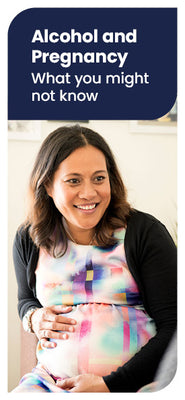Alcohol and pregnancy: what you might not know - HE2523

Information about the impact of drinking alcohol in pregnancy and while breastfeeding on unborn and breastfeeding infants.
The full resource:
How can drinking harm your baby?
When you’re pregnant, every time you drink alcohol, your baby is drinking alcohol too. All alcohol is carried in your blood stream, through the placenta, to your baby. Your baby can’t break down alcohol like you can.
If you drink alcohol while pregnant…
Your baby may not grow properly, especially their brain.
There’s a risk that your baby may have a range of life-long problems, known as fetal alcohol spectrum disorder or FASD. Problems may be seen soon after birth, but most may not be noticed until the child is older, when they may have trouble learning or socialising or have behavioural problems.
Your baby is more likely to be born prematurely.
You are more likely to lose your baby through a miscarriage or stillbirth.
Is fetal alcohol spectrum disorder (FASD) preventable?
Yes, by being alcohol free while you’re pregnant. Not all babies are affected the same way by alcohol. Cutting out alcohol altogether avoids any possible harm.
Can you drink at all?
No, there is no known safe amount of alcohol to drink during pregnancy. It’s advised not to drink any alcohol when pregnant.
Alcohol can harm a baby’s development at any stage of the pregnancy. This can be even before you know that you are pregnant. If you’re trying to get pregnant, or there’s a chance you could be pregnant, don’t drink alcohol.
Are all types of alcoholic drinks harmful?
Yes, all types of alcoholic drinks can harm your baby, including beer, wine, cider, spirits or ready-to-drink spirits (RTDs).
Is there a chance you could be pregnant or become pregnant?
If you are trying to get pregnant, be alcohol-free. Alcohol can harm a baby from conception onwards.
If you think your contraception may have failed, don’t drink alcohol until you know for sure that you’re not pregnant.
If you’re not trying to get pregnant, use an effective contraception method.
What if you drank alcohol before you found out you were pregnant?
It’s never too late to stop drinking. This will increase the chance of your baby being healthy. Talk to your midwife or GP if you’re worried about it.
Breastfeeding and alcohol.
While breastfeeding, it's best to be alcohol free. Alcohol enters your breast milk and passes to your baby. This can affect your baby’s growth and development.
Plan ahead if you choose to drink when breastfeeding. Only breastfeed when there’s no alcohol in your system. It takes about two hours for your body to break down one standard drink of alcohol. If you drink more than this, you will need to wait longer before breastfeeding.
Finding it hard to stop drinking? Get help.
You can get help by talking to your midwife, doctor, nurse or other health professional. They can discuss ways you can stay healthy during your pregnancy, answer your questions, or put you in touch with others who can help you.
The Alcohol Drug Helpline is also here for you. Contact them on 0800 787 797, alcoholdrughelp.org.nz or free text 8681, 24 hours, 7 days a week.
A message for partners and whānau.
You have an important role to play in helping your pregnant partner or whānau member to be alcohol free, and in looking after the health of the baby.
You can support by:
- being alcohol free too
- discouraging others from offering alcohol to anyone who may be pregnant
- making sure there are non-alcoholic drinks at social gatherings, workplaces, parties and events.
For help, contact the Alcohol Drug Helpline on 0800 787 797
To order resources, visit resources.alcohol.org.nz